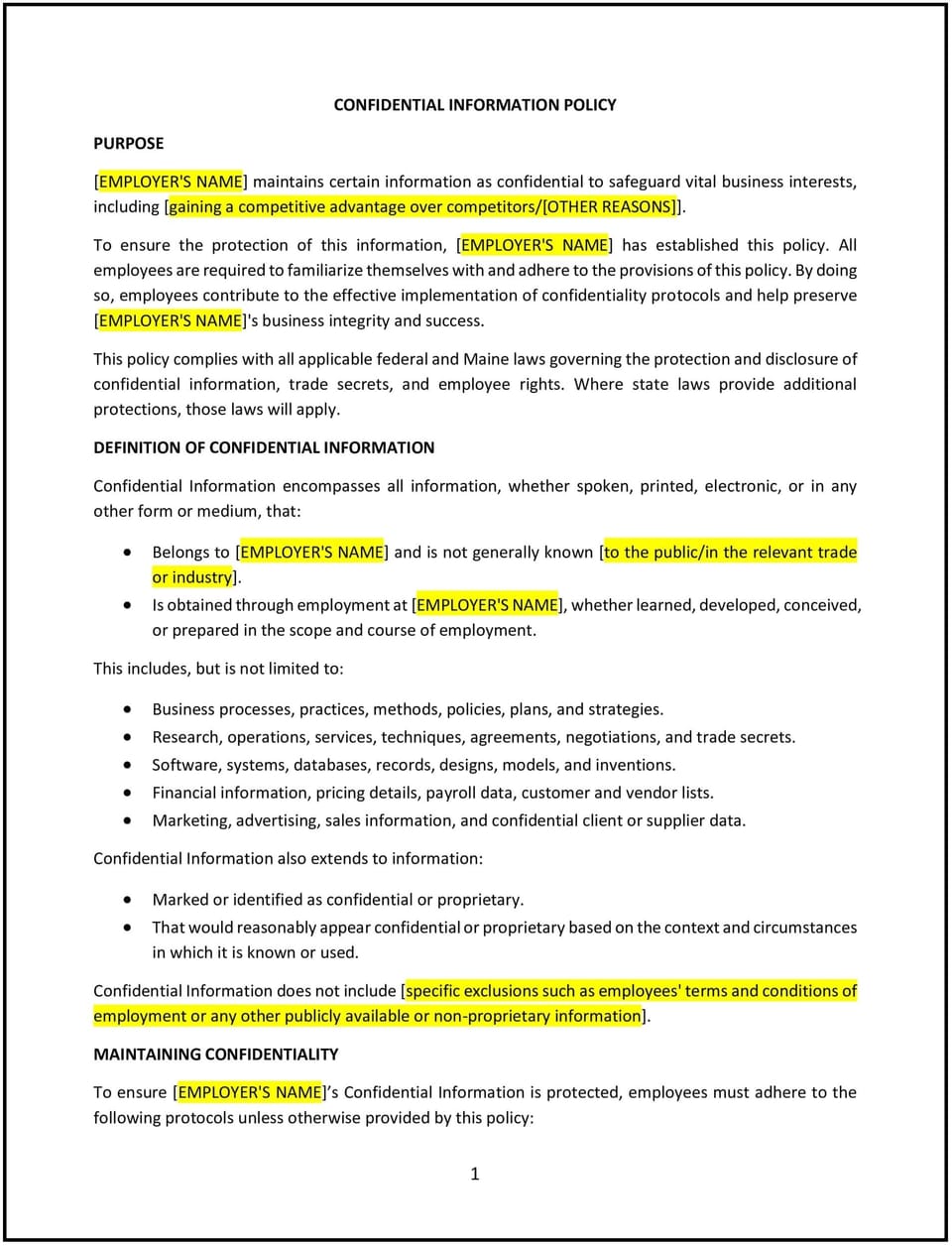Confidential information policy (Maine): Free template

Confidential information policy (Maine): Free template
This confidential information policy is designed to help Maine businesses protect sensitive company data and ensure employees understand their responsibilities in handling confidential information. It provides guidelines for accessing, sharing, and safeguarding information, minimizing risks of data breaches and unauthorized disclosures.
By implementing this policy, Maine businesses can safeguard their assets, build trust with clients and employees, and ensure compliance with applicable laws and regulations.
How to use this confidential information policy (Maine)
- Define confidential information: Specify what constitutes confidential information, such as trade secrets, financial data, client information, or proprietary processes.
- Outline access controls: Detail who is authorized to access confidential information and under what conditions.
- Provide handling guidelines: Include instructions for securely storing, sharing, and transmitting confidential information.
- Address breaches: Specify the steps employees should take if they suspect a breach or unauthorized disclosure of confidential information.
- Include confidentiality agreements: Require employees to sign agreements acknowledging their responsibilities under the policy.
- Clarify consequences: State the disciplinary actions for policy violations, including termination or legal action if necessary.
- Review regularly: Periodically update the policy to reflect changes in Maine laws, business practices, or data security requirements.
Benefits of using this confidential information policy (Maine)
Implementing this policy provides several benefits for Maine businesses:
- Protects sensitive data: Reduces the risk of unauthorized access or disclosures.
- Ensures compliance: Aligns with Maine and federal data protection laws, minimizing regulatory risks.
- Builds trust: Demonstrates a commitment to safeguarding client, employee, and company information.
- Promotes accountability: Clarifies employee responsibilities in managing confidential information.
- Enhances security: Establishes clear protocols for handling and storing sensitive information.
Tips for using this confidential information policy (Maine)
- Train employees: Provide regular training on identifying and handling confidential information securely.
- Use technology safeguards: Implement tools such as encryption, access controls, and secure file-sharing platforms to protect sensitive data.
- Monitor compliance: Regularly audit processes to ensure employees follow the policy.
- Foster a culture of confidentiality: Encourage employees to prioritize data protection in their daily tasks.
- Document incidents: Maintain detailed records of any breaches or policy violations to address issues and improve future practices.
- Stay updated: Monitor changes in Maine data protection laws to keep the policy current.
Q: What types of information are considered confidential under this policy?
A: Confidential information typically includes trade secrets, financial data, employee records, client information, and proprietary business processes.
Q: How can businesses ensure employees handle confidential information securely?
A: Businesses should provide training, implement access controls, and use secure tools for storing and sharing sensitive data.
Q: How often should businesses review their confidential information policy?
A: Businesses should review the policy annually or whenever there are updates to Maine laws or data security requirements.
Q: What actions should businesses take if confidential information is breached?
A: Businesses should follow their breach response plan, including investigating the incident, notifying affected parties, and implementing corrective measures.
Q: Are employees required to sign confidentiality agreements?
A: Yes, businesses should require employees to sign agreements acknowledging their responsibilities under the policy.
Q: How can businesses monitor compliance with the policy?
A: Businesses can conduct regular audits, monitor access to sensitive information, and review employee adherence to handling guidelines.
Q: What disciplinary actions can businesses take for policy violations?
A: Businesses can impose disciplinary actions such as warnings, suspension, termination, or legal action, depending on the severity of the violation.
This article contains general legal information and does not contain legal advice. Cobrief is not a law firm or a substitute for an attorney or law firm. The law is complex and changes often. For legal advice, please ask a lawyer.


